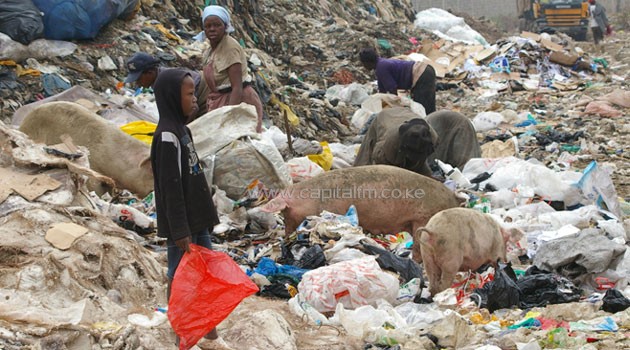
Even the Dandora dumpsite – which could be described as an effigy of the plastic bag – the self confessed green economist says, could be looked at as just a smelly, infested, eye sore or a business opportunity/XINHUA FILE
Sentiments that are not the preserve of Cavendish but shared by United Nations Environment Programme (UNEP) Executive Director Achim Steiner – at least where the prominence of the plastic bag is concerned – who has lived in Kenya for the last eight years by virtue of his office.
“I’m always very sad when I see the kind of waste and litter around Lake Naivasha for example. You can easily see plastic bags really are the most prominent feature in the landscape. Yet Kenya for years has already had legislation pending on actually phasing out thin film plastic bags. And the question is why hasn’t it happened, why isn’t it followed through?” he poses to Capital FM News.
READ Plastic tide ‘causing $13 bn in damage’, UN says
It’s a problem Kenya’s Cabinet Secretary for Environment Judi Wakhungu labels as, “complicated.”
“When it comes to the Environment I do think that Kenya has always been a leader when you look at legislation and also when you look at policies. I think where the challenge from the Kenyan perspective is, is that the sectors do not implement at the same level. “So for instance, although we have standards for waste management, very few people actually use those standards. So my mandate ends at creating the standards but it does not now continue to make sure that people do not just throw waste haphazardly,” she explains.
In part, she says, due to a lack of, “foot soldiers”; people who can go out and ensure environmental legislation, and policy is being adhered to.
Rwanda however, Steiner points out, has found a way to do away with plastic bags.
“When I travelled to Kigali I stood at the customs queue and one of the tourists in front of me was asked to hand over his Duty Free bag and he thought you know, why are you taking away my Duty Free purchases and the customs official said no, no we’re not interested in your purchase, we just want your plastic bag because we don’t have plastic bags in Rwanda,” Steiner recounts adding, “I think it is a commitment to, once you have identified the problem, actually tackle it and then to align government through its different capacities and sectors and also the public in actually implementing them.”
Ephraim Murenzi, First Counsellor, Rwanda High Commission in Kenya, tells Capital FM News that despite the initial, inevitable resistance to change, a plastic bag free State can be reached.
“I remember in early 2000, or even from 1994, you could see so many plastic bags. Whenever there is this high winds, you could see them flying in the air. In dustbins you could see them. Along the road you could see them. You know, they were everywhere because they were being used every day in supermarkets, in shops, in markets, foods, they were being used for everything so they were everywhere and they were not helping us,” he says.








































